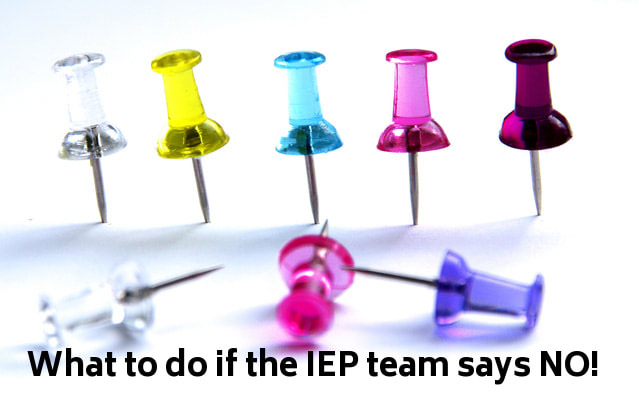What should a you, as a parent do if the IEP team says no to your request at an IEP Meeting.
Prior Written Notice Letter.
The first thing that should happen if the district denies your request at the IEP is for the district to provide you with a Prior Written Notice (PWN) letter. You have a right to receive PWN, when the school initiates or refuses your request to initiate a change in your child’s identification, assessment, or educational placement in special education. (20 USC 1415[b][3] and (4), 1415[c][1], 1414[b][1]; 34 CFR 300.503; EC 56329 and 56506[a]) It is your right as a parent to receiving this letter, if you do not receive it your rights have been violated.
Do Nothing.
It is important to really think about whether your request is reasonable and if the service is really needed by your child. Think about what the district’s arguments are for denying the service. If you decide the district arguments are reasonable, then you should do nothing.
Make a New Goal.
A good way to monitor whether or not your child needs is a service is to have a goal in the IEP regarding the problem. If you have a goal, then you can measure whether or not your child meets the goal. If the goal is not met, then perhaps the service you were requesting would help remedy the problem.
Request a New Assessment.
Did the district say no because the district does not have all the information needed to make the decision? Did you ask for Assertive Technology and there has been no assessment? Did you ask for an aide, but have not done a Functional Behavior Assessment? Does an old assessment seem out of date and no longer contains accurate information? If so, make a written request for the new assessment and in your request explain why you need the new assessment.
Informal Dispute Resolution.
Many districts have an informal dispute resolution procedure when there are disputes in the IEP process, including Los Angeles Unified School District. This is different that due process or mediation explained below. It is meant to me a quick informal solution to a dispute. As much as I would like for an informal process to work, my experience is that it generally does not produce a good outcome for the child. In one case, the district lost the paperwork and the issue dragged on for months. In other case, the district gave the parent a take or leave choice at resolution and there was no discussion. Yet in another case, the settlement agreement that district drafted was so vague and the parent signed away important parental rights. This is this is my main concern. Parents are signing away important educational rights without their knowledge. In sum, I have not found the informal dispute resolution process fruitful, but it doesn’t mean that others have been successful or that it could be better in the future.
Mediation Only.
Instead of filing for due process (and mediation) you could file for “Mediation Only” with the Office of Administrative Hearings (OAH). “Mediation Only” is used when a parent wants mediation, but does not want to have a hearing. Usually the mediation is scheduled about 15 days after filing for mediation and is voluntary. This means that if the district does not want to attend, then the mediation is canceled. Attorneys and authorized representatives are not permitted to attend a mediation in a “Mediation Only” case. I am not strongly in favor of filing for “Mediation Only” because again a you might be signing away rights in the settlement agreement that you are not aware of or do not fully understand. Also, as explained fully below, only about 2% actually do go to hearing and most are resolved with a settlement agreement in favor of the student, there is little downside in filing for due process.
Due Process.
Due Process (with mediation) is an administrative hearing process filed with the Office of Administrative Hearings (OAH). If the student is successful, either by settlement or hearing decisions, then the district pays the attorney’s fees. The vast majority (above 90% see here: http://www.dgs.ca.gov/oah/SpecialEducation/Resources/SEReportArchive.aspx) are settled with a settlement agreement in which the district pays the student’s attorney’s fees. During the Due Process there is an “informal resolution session” approximately 15 to 20 days after the complaint is filed and a mediation thereafter. The majority of cases settle before mediation or just afterwards. Prior to filing for Due Process a special education attorney will be able to review the documents and facts of your child’s case and tell you whether you will be successful in due process.
Do not hesitate to contact me to discuss any of the above options when an IEP team says NO!


Add Comment